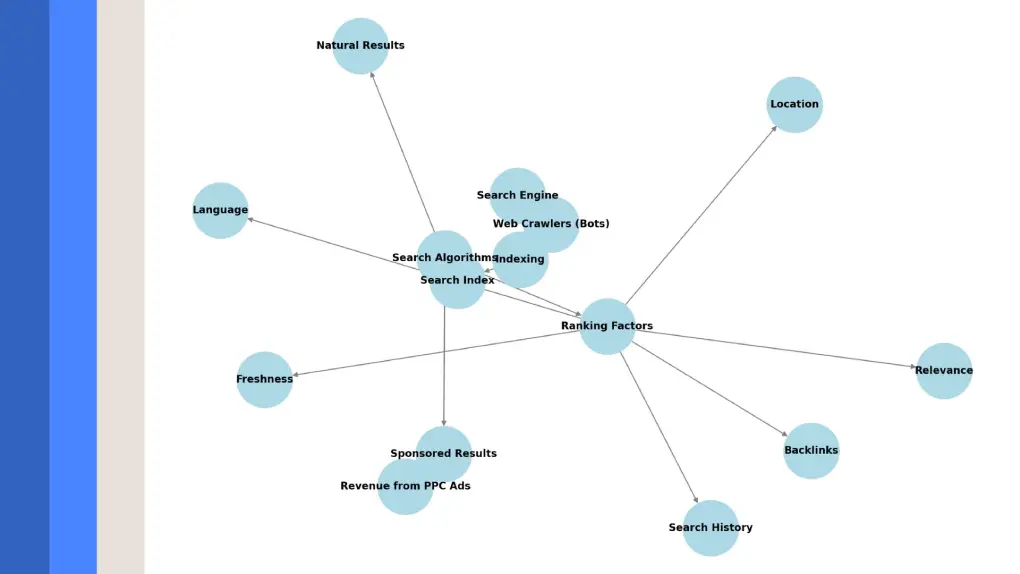Search Engine: Web crawlers are used by search engines to comb through billions of pages. Crawlers sometimes referred to as spiders or bots, search the web and click links to discover new pages. After then, these pages are included in an index from which search engines fix results.
Search engines are databases of web material that may be searched. They consist of two major components:
1. A search index. A computerized source of web page information.
2. One or more search algorithms. Computer program or programs responsible for matching search index results.
How search engines are financially supported?
There are two kinds of search results from search engines:
natural outcomes derived from the search index. Paying to be here is not an option.
Sponsored outcomes from marketers. To be here, you can pay.
The advertiser pays the search engine each time a user clicks on a sponsored search result. Market share is important because of pay-per-click (PPC) advertising. More users translate into more ad clicks and income.
How search engines generate revenue
The method used by each search engine to create a search index varies. A condensed version of Google’s procedure is shown below.

How Google constructs its index of searches
lets dissect it.
URLs:
A known set of URLs is the starting point for everything. Although Google finds these in a variety of ways, the three most popular ones are:
- From backlinks: There are hundreds of billions of websites in Google’s index. Google can discover a new page if it is linked to from a well-known page.
- From site maps: Sitemaps let Google know which files and pages you believe are crucial to your website.
- From submitted URLs: Google Search Console allows site owners to request that specific URLs be crawled.
- Crawling: A computer bot known as a spider crawls websites and downloads well-known URLs. Googlebot is Google’s crawler.
Rendering and processing
- Google uses processing to comprehend and extract important data from pages that have been crawled. In order to accomplish this, it must render the page, which entails executing the website’s code to determine how viewers would perceive it.
- No one outside of Google is familiar with every aspect of this procedure. But it makes no difference. Really, all we need to know is that it entails content storage for indexing and link extraction.
Indexing
- The process of indexing involves adding processed data from crawled pages to the search index.
- When using a search engine, you look up information in the search index. Getting indexed in well-known search engines like Google and Bing is crucial because of this. You must be listed in the index for users to find you.

Search algorithms: what are they?
Formulas known as search algorithms are used to match and rank pertinent index results. Google’s algorithms take a lot of factors into account.
- Important elements affecting Google ranking:
- Since Google hasn’t revealed them, no one is aware of every Google ranking criteria. However, we do know a few important ones. Let’s examine some of them.
- Backlinks Backlinks are links pointing to another page on a website. They are among the most powerful ranking variables for Google. This is most likely the reason that in our analysis of more than a billion pages, we saw a substantial relationship between linking domains and organic traffic.
- Pertinence:
- The usefulness of a particular result to the searcher is known as relevance. Google can determine this in a variety of ways. In its most basic form, it searches for pages that have the same keywords as the query. In order to determine whether the outcome was helpful to others, it also examines interaction data.
- Freshness:
- One ranking criteria that depends on the query is freshness. It works better for searches that want new results. This explains why the top result for “new Netflix series” was just released, but not for “how to solve a Rubik’s cube.”
- Location:
- When you conduct a local search, Google uses your location to tailor the results. All of the results for “Italian restaurant” are therefore from or about nearby eateries. Google is aware that you are unlikely to take a lunch flight central around the world.
- Language:
- Google is aware that providing Spanish users with English results is pointless. For this reason, it gives users who speak other languages preference for localized versions of material, provided they are available.
- History of searches:
- Google keeps track of your activities and locations to provide you with a more tailored search experience. Although most people definitely don’t, you can choose not to participate.
Important lessons learned
The index and algorithms are the two primary components of a search engine. It follows links to discover new pages and crawls well-known pages to expand its index. Returning the best, most pertinent results is the goal of search algorithms. The quality of search results is crucial for increasing market share. No one is aware of every ranking element that Google uses for organic results. Relevance, freshness, and backlinks are important ranking considerations. Google tailors its results according to your search history, language, and location.





